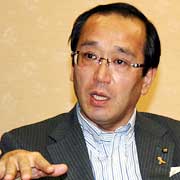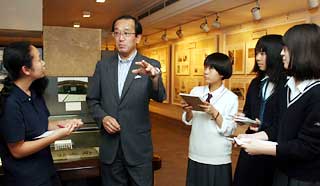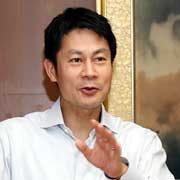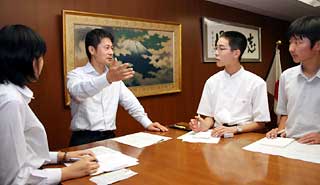Asking the mayor and governorabout Hiroshima
Kazumi Matsui, 58, the mayor of Hiroshima City, and Hidehiko Yuzaki, 45, the governor of Hiroshima Prefecture, are the "faces" of Hiroshima, the first city in the world to be attacked with an atomic bomb. The lives of both men, in fact, are strongly connected to the bombing. Mr. Matsui's mother was in Hiroshima that day while Mr. Yuzaki's father was a professor who was involved in researching the hypocenter area and served on a committee which estimated the death toll of the atomic bombing. (By the end of 1945, 140,000 people are believed to have died, with a margin of error of 10,000 people.)
For this issue we interviewed the two Hiroshima-area leaders, asking their thoughts about Hiroshima's role and the abolition of nuclear weapons, as well as their memories of childhood.
They both believe it would be difficult to quickly eliminate nuclear weapons, due to the current nuclear policies many nations hold. At the same time, they feel a passion for promoting the realization of a peaceful world by asking the leaders of other countries and regions to visit Hiroshima and conveying Hiroshima's wish for peace to the world.
 Mayor Kazumi Matsui
Mayor Kazumi Matsui 
Mother experienced the atomic bombing / Grew up watching the revival of the city

Kazumi Matsui
Born in the city of Hiroshima. He graduated from Ushita Elementary School, Ushita Junior High School, Motomachi High School, and Kyoto University. In 1976 he began working at the Ministry of Health, Labour and Welfare. He served as the first secretary of the Japanese Embassy in the U.K., the general manager of the Worker's Life Department, and the director-general of the Central Labour Relations Commission, before leaving the Ministry in February 2011. He was sworn in as mayor of Hiroshima in April. |
As the mayor of Hiroshima, what are your intentions with respect to appealing for peace?
I want everyone in the world to feel that nuclear weapons should be abolished from the earth. Starting with our city, I hope that all Hiroshima citizens will firmly believe that nuclear arms must be eliminated.
"Peace" doesn't only imply physical conditions, such as the absence of war and armed conflict. It also includes psychological aspects. If your mind is troubled or uneasy, a feeling of peace can't be achieved. I think the work of the mayor involves enabling people to feel "peace" by helping them to live their lives fully.
Did any members of your family share their A-bomb experiences with you?
My mother experienced the bombing, but she told me very little about it. She was going to a girls' school at the time, and she was trapped under the school building when it collapsed. I heard only that she aided some of her friends, but some other friends died. My mother passed away at the age of 43.
When you were a child, did you see the scars of the bombing in the city?
There were lot of wooden shacks around Hiroshima Castle and along the river near Hiroshima station. These were similar to temporary shelters found today for people displaced by natural disasters. The shacks hung halfway over the river, standing there on wooden poles driven down into the water. The moat surrounding the castle dried up and grew wild. Still, people were doing their best to go on, and the city was bustling with life.
Do you think it's possible to eliminate nuclear weapons?
I doubt that nuclear weapons can be eliminated in my lifetime. The reality is, when two countries are at odds, nuclear weapons are used to gain the upper hand and maintain superiority.
You have said that your concept involves "appealing for peace from home" as opposed to "appealing for peace out in the world." Could you explain this?
Our appeals for peace should not only be made while visiting other countries, we should also be welcoming visitors to Hiroshima to show the spirit of our city for peace and to convey the thoughts of the A-bomb survivors. Gatherings to discuss peace issues can be held in Hiroshima and Nagasaki. For example, for every ten official trips the previous mayor made overseas, I would like to reduce that number of international trips to two, while playing host for visitors to Hiroshima eight times.
What do you think of the "2020 Vision Campaign," promoted by Mayors for Peace with the goal of eliminating nuclear weapons by that year?
I would like to advance the campaign with an eye toward eliminating nuclear weapons and war. Though I have doubts whether the target year is feasible, I will do what I can to promote this effort.
I imagine you have many opportunities to meet people from abroad. Can you speak English?
I lived in London for three years, so I can speak English to a certain degree, but I wouldn't say that my English is as good as my Japanese. I can understand what people are saying, for the most part, when the conversation is in English.
 Hiroshima Mayor Kazumi Matsui shares his memories of childhood in the exhibition hall of the old City Hall building. (Photo taken by Masataka Tanaka, 16)
|
 Governor Hidehiko Yuzaki
Governor Hidehiko Yuzaki 
Father researched the atomic bombing / Peace issues close to my life

Hidehiko Yuzaki
Born in the city of Hiroshima. He graduated from Itsukaichiminami Elementary School, the junior high and high school attached to Hiroshima University, and Tokyo University. He began working at the Ministry of Economy, Trade and Industry in 1990, serving as the deputy director of the Americas Division, then worked for an American investment company until 2000. After that, he founded a communications company which helped develop broadband service. In November 2009, he became the governor of Hiroshima Prefecture. His father was the late Minoru Yuzaki, a sociologist and professor at Hiroshima University. |
What do you find most striking in your interactions about peace with people from abroad?
A wide range of people, from Nobel Prize laureates to JICA (Japan International Cooperation Agency) trainees, ask me the same question: How did Hiroshima manage to rebuild after the atomic bombing? I reply that the key to this was the people's firm belief that the city could be reconstructed.
We understand that your father was involved in researching the atomic bombing. What sort of influence did he have on you?
My father died when I was young so I can't say that he had a direct influence on me. Still, peace issues have always been part of my life.
My father was involved in research that dealt with situations of survival in the area around the hypocenter. For this reason he needed to speak to survivors who had lived in the area, but most of the residents within a radius of 500 meters from the hypocenter were killed. It was very difficult for him to find such survivors, though, because their whereabouts were largely unknown. But my father did his best to track them down, one by one, and listen to their stories. He cherished his relationships with the atomic bomb survivors.
When you were a child, what did you think about the atomic bombing and peace?
There was a connection between the atomic bombing and discrimination. People were afraid of others finding out that they were A-bomb survivors. At the same time, they wanted the reality of the destruction caused by the atomic bomb to be known. I remember thinking how scary the atomic bomb was. And I wondered why human beings continued to possess nuclear weapons. But I was actually more interested in issues involving diplomacy and international politics than I was in the problem of nuclear weapons.
Over the years, a lot of people have appealed for the abolition of nuclear weapons, but that goal has not been realized. Why has this effort fallen short?
It's not simply a problem involving nuclear weapons. The Cold War is a good example. When conflict arose as a result of the United States and the former Soviet Union flexing their might at national borders, nuclear weapons were part of that equation. To move toward the elimination of nuclear weapons, negotiation is needed among the nuclear powers as to how national security can be preserved without these arms. Such negotiation has begun between the United States and Russia. Some argue that we can maintain security without nuclear weapons, but this position has no weight as long as the nuclear powers don't believe it's possible.
At the prefectural office, we are working on a "global peace plan" to take a comprehensive approach to creating a peaceful world. The plan includes the role that Hiroshima should play in building international peace and advancing nuclear abolition. This November we will announce the plan at U.N. headquarters in New York. I hope to meet Secretary General Ban Ki-moon to ask for his support.
What can junior high and high school students do for peace?
As a first step, you can study about peace issues. The next thing is to develop your own perspective and thoughts on peace. And then take action based on what you have learned. Give careful thought to what you can do to help.
 Hiroshima Governor Hidehiko Yuzaki responds to questions from the junior writers in his office. (Photo taken by Masaya Obayashi,14)
|
- The Cold War The global standoff that formed in the aftermath of World War II, with Western allies, led by the United States, on one side, and the communist bloc, led by the Soviet Union, on the other. In November 1989, the Berlin Wall fell, which had been a symbol of the Cold War and divided East and West Germany. At the Malta Summit in December 1989, the end of the Cold War was declared by the leaders of the United States and the Soviet Union, and in July 1991, both nations signed the first Strategic Arms Reduction Treaty (START).